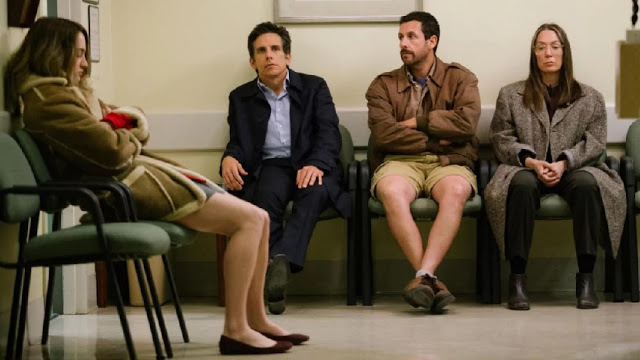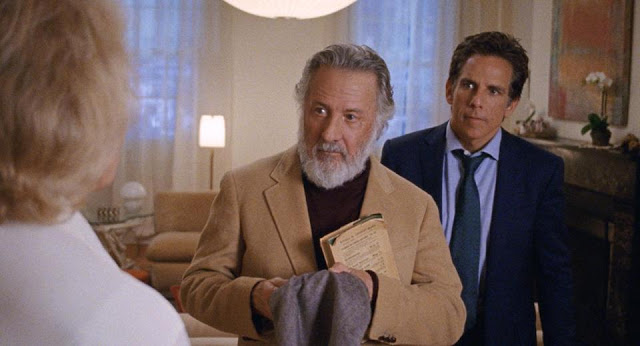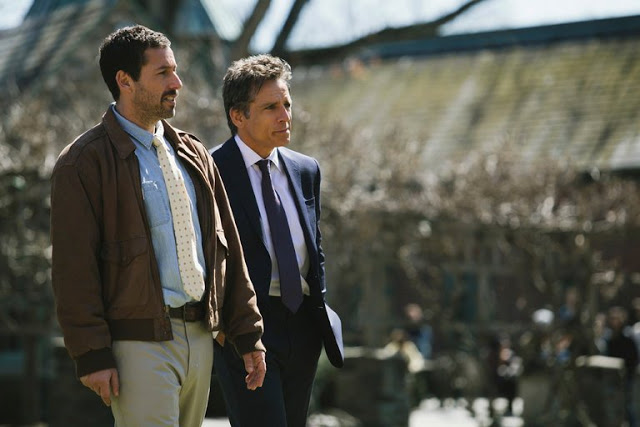You might think, upon learning that The Meyerowitz Stories stars Adam Sandler and Ben Stiller—and that it includes a scene where the two slap-fight and wrestle pathetically on a university quad—that the movie is a stupid comedy. It isn’t, though it does feature a number of acrid laughs and a few displays of idiocy. Instead, The Meyerowitz Stories is another of writer-director Noah Baumbach’s incisive portraits of insecurity and indecision. As with many of his films, it’s sharply observed, making it more thoughtful than enjoyable; Baumbach’s talent for conjuring realistically flawed people is so pronounced that it becomes almost uncomfortable. Watching this astute, upsetting movie, you are likely to wince frequently, partly because its characters tend to behave terribly, and partly because you will recognize in them slivers of your friends, your family, and yourself.
Told in a seemingly patchwork fashion that’s deceptively coherent, The Meyerowitz Stories is in some ways a genealogical exercise, examining the strained relationships that form the branches of a cluttered family tree. The crusty patriarch is Harold (Dustin Hoffman), a sculptor of minor renown who is constantly explaining to polite listeners why his work is so underappreciated. He is more enamored of his art than of his three children, each of whom carries lingering scars and resentments from their childhood. Danny (Sandler) once had aspirations of being a musician, but he ended up a house husband, and he’s now crashing in his father’s Brooklyn brownstone after separating from his wife. His sister, Jean (Elizabeth Marvel), works a dull office job in Rochester but often drives down to the city to help keep the peace and laments that nobody pays attention to her. And their half-brother, Matthew (Stiller), long ago escaped the family’s suffocating New York vortex for LA, where he thrives as some sort of accountant (Baumbach is intentionally vague on the details) but battles marital woes and middle-age ennui.
Baumbach presents these troubled characters with minimal fuss or adornment, instead plunking you into the middle of scenes and letting the rhythms of his dialogue—a cadence that comprises feigned politeness, festering annoyance, and passive-aggression—map out the tension and bitterness that underlie every mundane conversation. The movie nominally proceeds as a series of loosely connected vignettes, and the title’s official parenthetical, “New and Selected,” reinforces the idea that the episodes we’re watching are mere glimpses into more fully realized off-screen lives, lives that are undoubtedly filled with sadness, confusion, and longing.
Not that The Meyerowitz Stories is an outright dirge. There are moments of genuine sweetness on display, particularly in the dynamic between Danny and his daughter, Eliza (Grace Van Patten), a precocious teenager who’s about to start college at Bard. An early sequence where the two perform a piano duet while the family watches is one of the lovelier scenes in the filmography of a director who’s made a career out of chronicling awkwardness and failure.
Yet Danny and Eliza’s mutual warmth is not merely a salve to the audience’s tattered nerves. It instead plays as contrapuntal to Danny’s frosty relationship with Harold, allowing us to infer that Danny developed his own parenting style—he treats Eliza as much like a friend as a daughter—as a conscious corrective, steadfastly refusing to inherit his father’s sins.
Those sins form the backbone of The Meyerowitz Stories, which is why Hoffman’s caustic performance is so crucial. Proud, crotchety, and possibly senile, Harold could have been lifted out of a Eugene O’Neill play, except that he’s too oblivious to be intentionally mean. This somehow makes him worse; Harold’s extreme self-absorption, and his resulting indifference toward his children, is honest rather than calculated. This basically makes him a monster, but Hoffman wisely underplays the part, eschewing old-man scene-chewing in favor of a low-key ruthlessness. The rest of the cast complements him nicely, particularly Sandler, who proves again that he can convey deep reserves of anguish and need if he just gives a damn.
Baumbach always exhibits a light touch with actors, and his voice is his own; his dialogue is intelligent and fast-paced but rarely overwritten. Still, he seems to be borrowing a bit here, and not just from his usual inspiration in Woody Allen. Several elements of The Meyerowitz Stories—the handful of title cards, the family in quiet crisis, Stiller’s patented neuroticism—recall The Royal Tenenbaums. But Baumbach is a more jittery and less accomplished director than Wes Anderson, favoring syncopation over formalism. His favorite technique here, which he uses ad nauseam, is to smash-cut out of scenes, often while characters are in the middle of a sentence. It’s a jarring move that adds some energy the first few times before eventually becoming stultifying.
Perhaps Baumbach felt compelled to enliven material that, while insightful and intimately scaled, doesn’t have a whole lot of heft. Despite some shards of random humor (typically in the form of Eliza’s silly student sexploitation films), The Meyerowitz Stories isn’t very funny, and it’s too unpleasant to be entertaining. It’s more interesting to ponder than to watch.
But it is legitimately sad, grappling not just with mortality but with the sobering realization that our lives and personalities are often shaped by forces we can’t control. And there is integrity in Baumbach’s refusal to provide his characters with the easy catharsis that they so desperately crave. (Late in the film, a frustrated Danny smashes a plate on the floor in an attempted show of anger, then instantly apologizes because he didn’t realize it would make so much noise.) Here again, the slice-of-life theme comes into play; the movie patiently recounts the characters’ experiences but doesn’t generate any seismic changes. After the credits roll, they’ll keep living their lives, possibly as confused and impotent as they were before we met them.
In one perceptive scene—which Baumbach boldly calls back later on—Danny, Jean, and Matthew meet with a grief counselor, who suggests that they say what they need to say to Harold before he dies. His research, he informs them, indicates that the following statements might be helpful: “I love you; I forgive you; forgive me; thank you; goodbye.” It’s a crushingly banal suggestion, but the Meyerowitz kids don’t seem to take any offense, because what else are they going to say to the man who so casually punished them all their lives?
As for me, I can’t quite hide my disappointment that The Meyerowitz Stories lacks the zip of Baumbach’s best works, like the hard-won optimism of Frances Ha or the delightful joie de vivre of Mistress America (two films that, not coincidentally, starred his frequent muse, Greta Gerwig). Still, I appreciate this movie’s emotional sincerity, its meticulous human detail. So in keeping with its spirit of brutal honesty: Sorry, The Meyerowitz Stories—I don’t love you. But I do forgive you.
Jeremy Beck is the editor-in-chief of MovieManifesto. He watches more movies and television than he probably should.




